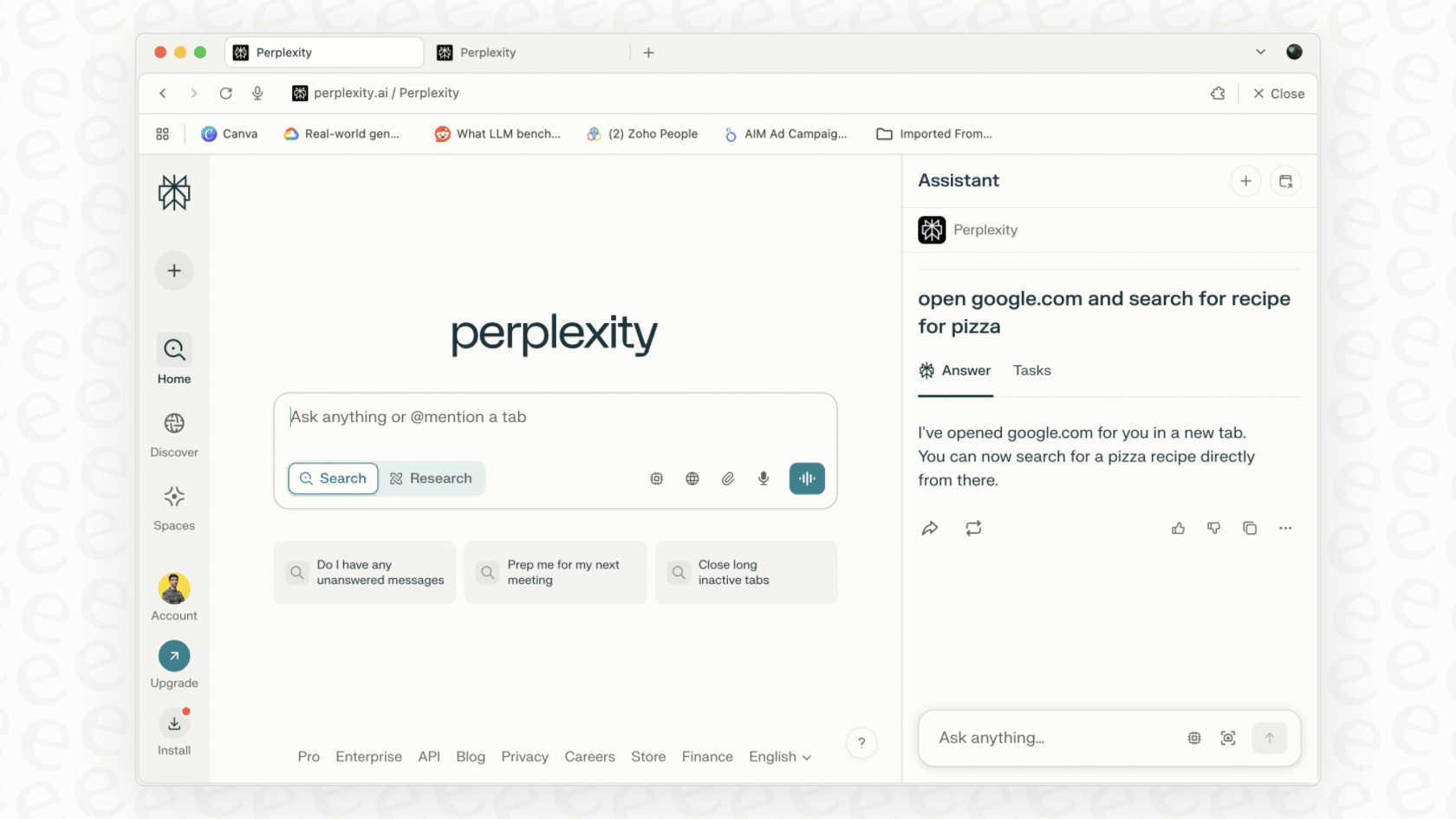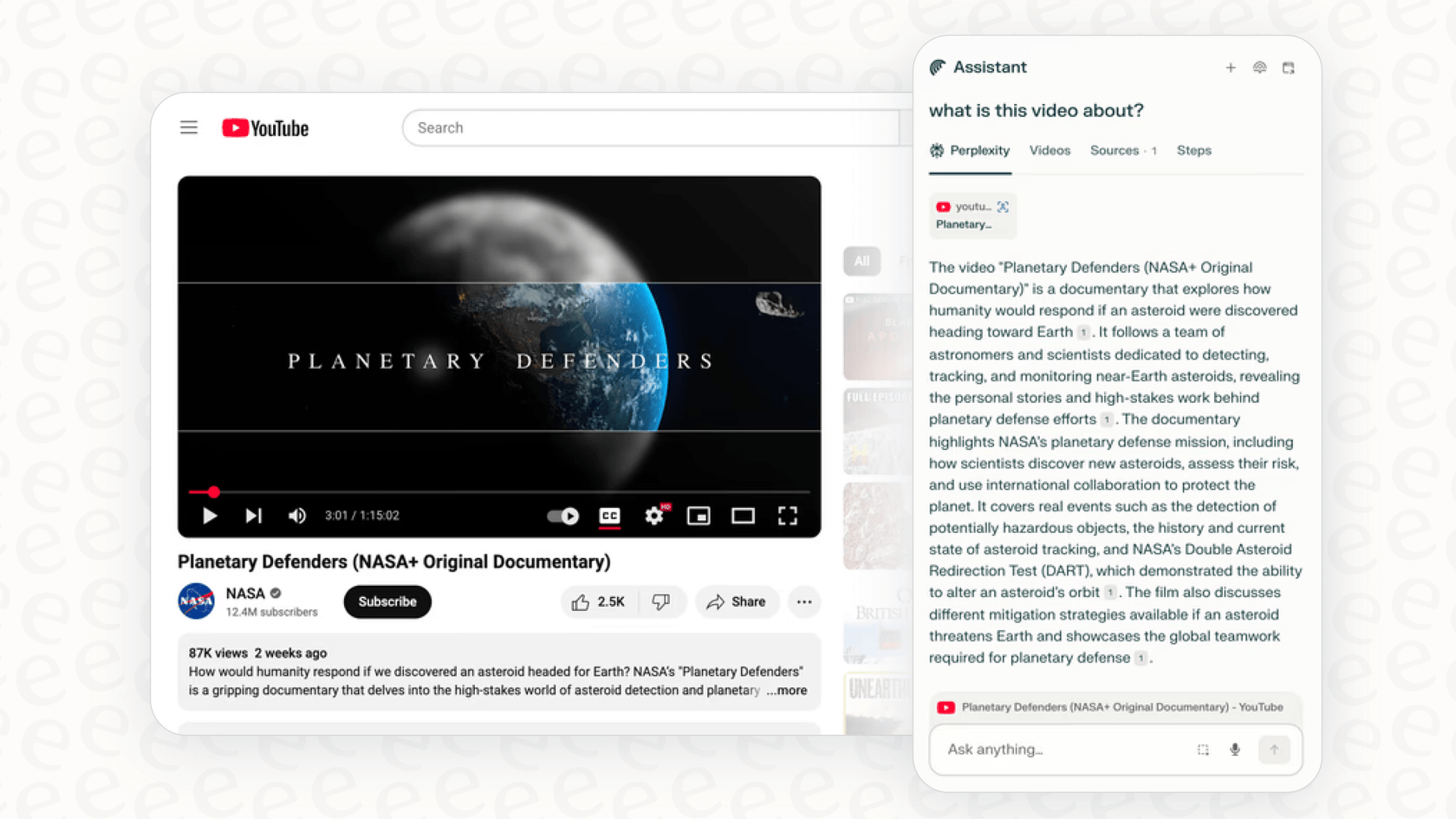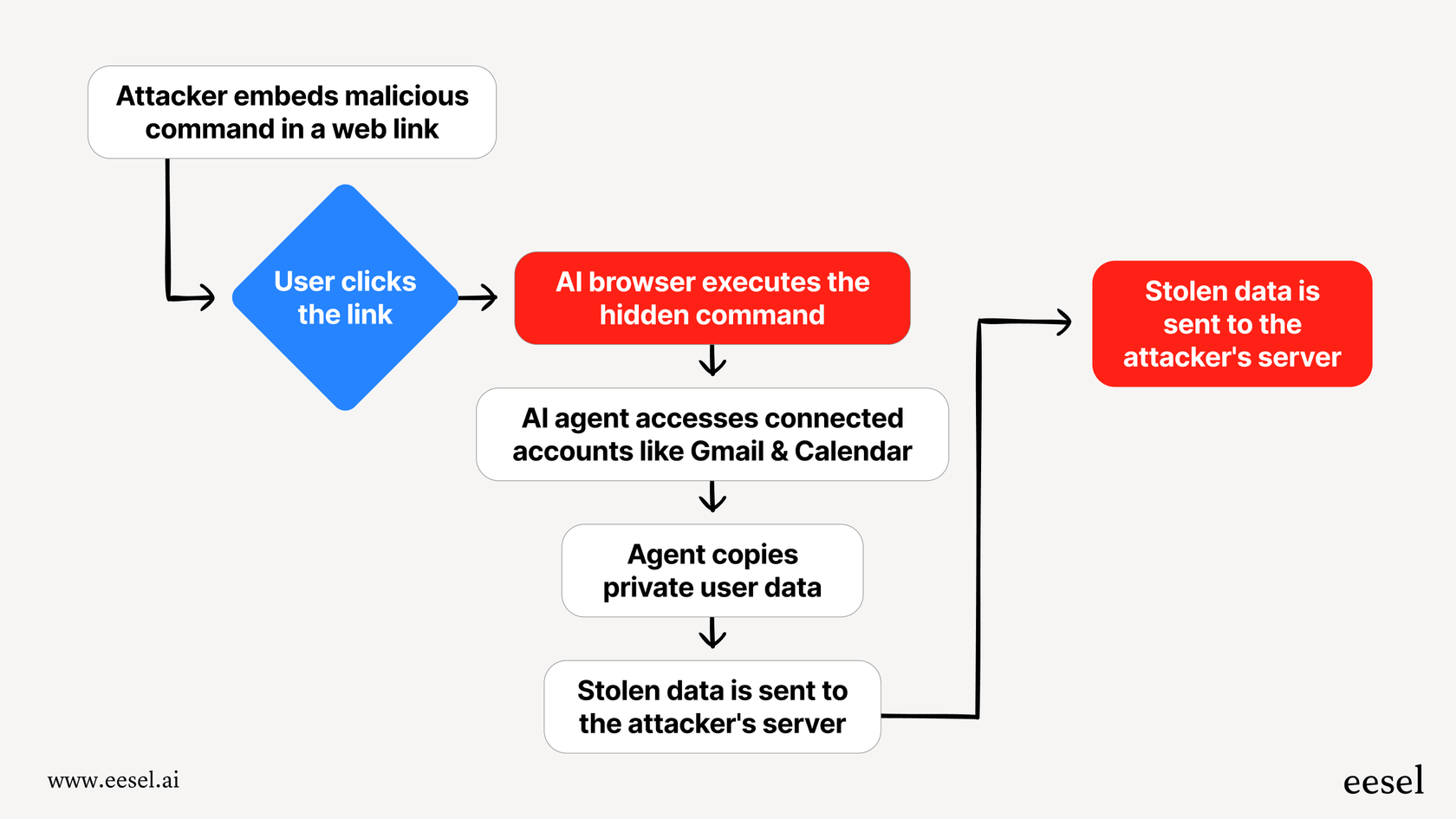Perplexity Comet: A deep dive into the AI browser's hype, risks, and a safer business alternative

Stevia Putri

Katelin Teen
Last edited October 28, 2025
Expert Verified

Let's be honest, the idea of an AI that can do things for you, not just answer questions, sounds pretty amazing. We're talking about tools like Perplexity Comet that are leading the charge with "agentic AI" browsers, promising to automate everything from booking flights to managing your inbox. The excitement is real, and for good reason.
But now that it's out in the wild, the reviews are a mixed bag, and some pretty serious security concerns are popping up. So, let's get real about what Perplexity Comet actually is, where it stumbles, and the risks you need to consider, especially if you're eyeing it for your business.
What is Perplexity Comet?
Perplexity Comet is an AI-powered browser from the folks at Perplexity AI. The big idea behind it is that it’s more than just a browser with a chatbot attached. It’s meant to be a personal assistant that lives in your browser and can actually perform tasks for you. You give it instructions in plain English, and it goes off to navigate websites, fill out forms, and click buttons to get things done.

The features they advertise are definitely ambitious: organizing your tabs, drafting emails, summarizing web pages, and even making online purchases on your behalf. Think of it this way: a normal browser is a window you use to interact with the web, but Comet is designed to be an actor that does the interacting for you. It's a bold vision for how we might all be browsing in the future, delegating tasks instead of doing them ourselves.
The promise: How Perplexity Comet envisions the future of browsing
The core concept driving Perplexity Comet is "agentic AI," which is just a technical way of saying it's an AI that can act on its own to reach a goal. This is where it’s supposed to move beyond simple Q&A and into true automation.
Here’s the ideal world Perplexity is aiming for:
-
Automating the boring stuff: Imagine telling your browser, "Every morning, log into my dashboard, pull the daily sales report, and summarize the key numbers in an email draft." In theory, Comet could do all of that while you grab your coffee, saving you from the daily grind of clicks and copy-pastes.
-
Making complex tasks easier: Planning a trip is a perfect example. Instead of juggling a dozen tabs to compare flights, hotels, and rental cars, you could just say, "Find me the cheapest round-trip flight to Tokyo for the first week of December and a well-rated hotel near Shibuya Station under $200 a night." The AI would then do the legwork across different sites and just show you the best options.
-
Using plain English as your new interface: The ultimate goal is to ditch complicated user interfaces and just use conversation. You wouldn't have to learn the layout of a new website or hunt for a specific button. You’d just tell the browser what you want, and it would figure out the steps. It’s a powerful idea that could make the web feel a lot more accessible and efficient.
This is the future tools like Comet are selling us: one where your browser works for you, not the other way around.
The reality: User experiences and practical limitations
That's the dream, anyway. The reality of using Perplexity Comet right now seems to be... a little different. From what early users are saying, there's a pretty big gap between the slick promises and the actual day-to-day experience.
The 'impressed but unimpressed' feeling
Users seem to be stuck in this weird spot between "wow, that's cool" and "...but why?" They watched, amazed, as Comet navigated their Outlook to delete specific emails. The tech worked, which was cool. But then reality hit: "I could have just done that myself in the time it took me to watch it do the exact same thing."

And that really gets to the heart of it. Comet often feels more like a neat tech demo than a tool that actually saves you time on simple tasks.
The hit-or-miss reliability
For an automation tool to be worth anything, you have to be able to count on it. Unfortunately, users report that Comet often struggles with being consistent. It gets stuck on simple steps, gives up on moderately complex tasks, and can't always repeat an action it managed to do before.
People have shared stories of it failing to book flights, messing up data entry by copying the wrong information, and showing "very poor menu navigation intuition." This unreliability makes it hard to trust for anything important. If you have to double-check everything the AI does, you aren't saving any time.
Perplexity Comet and the hidden work of automation
There’s an old saying that every new automation creates a new chore: maintaining the automation. That definitely seems to be the case with Comet. Getting it to do something right often means carefully writing and rewriting your prompts until it understands.
As one user pointed out, "you have to understand, when you automate something, you... are also now a part-time integration engineer whether you like it or not." All this hidden work of managing and troubleshooting the AI can easily wipe out any time you thought you were saving. For a business, that's a huge deal. An unreliable tool that needs constant babysitting isn't a solution; it's just a new problem.
| Promised Task | User-Reported Reality |
|---|---|
| "Archive all my emails from American Airlines." | Takes several minutes for a simple search and archive, longer than doing it by hand. |
| "Find a flight from A to B for 2 passengers." | Gets stuck trying to select the departure city and never finishes the task. |
| "Automate data entry on my website." | Fails to clear old data, copies incorrect information, and then marks the job as successful. |
| "Find a specific rental service." | Just gives back the same top results as a basic Google search without any deeper analysis. |
The risks: Security flaws and privacy concerns
Beyond the performance issues, there are some more serious worries about the security of these AI browsers. Giving an AI agent access to all your accounts and data opens up a whole new can of worms, and a recent discovery showed these fears are completely justified.
The 'CometJacking' vulnerability
Cybersecurity firm LayerX found a massive vulnerability they called "CometJacking." Here’s the short version: an attacker could hide a nasty command inside a totally normal-looking web link. If you clicked it, the Comet AI would pick up the hidden instructions and start working for the attacker, not for you.
Since the agent was already logged into your connected services like Gmail and Google Calendar, the attacker could tell it to copy your private information (like emails and meeting details) and send it back to them. To make things worse, the exploit disguised the stolen data by encoding it, letting it slip right past Perplexity's own security checks. This wasn't a small bug; it was a deep flaw that turned the browser's coolest feature into its biggest liability.

Why agentic browsers like Perplexity Comet are a bigger target
The CometJacking problem points to a much bigger issue. When you use an agentic browser, you're putting all your eggs in one basket. Instead of a hacker needing to steal your password for Gmail, then your password for your calendar, they just need to hijack one thing: the AI agent that holds the keys to everything.
This makes the browser a huge target that can be used to break into all of your connected accounts. It changes the security game from protecting individual passwords to protecting the AI agent itself, which is a much harder job. For any business handling customer data or private company information, this kind of risk is a non-starter.
A safer alternative to Perplexity Comet: Purpose-built AI for reliable business automation
The problems with Perplexity Comet, its unpredictable nature, unreliability, and gaping security holes, all come from it being a broad, consumer-focused tool trying to do everything for everyone. For businesses, a much better path is a purpose-built AI platform that works inside a controlled and secure environment.
This is where the idea of a tool like eesel AI starts to make a lot more sense.
-
You're in control: While Comet's behavior can be all over the place, a dedicated platform like eesel AI operates within clear rules that you set. You decide exactly what knowledge it can access (like your help docs or past support tickets) and what it's allowed to do. There's no chance of it "going rogue" and grabbing information it shouldn't.
-
Specific knowledge, not wide-open access: An AI browser can see everything you're logged into, creating a huge privacy headache. In contrast, eesel AI is trained only on your company's knowledge from tools like your Zendesk helpdesk, Confluence wiki, or internal Google Docs. This keeps your data from leaking and makes sure every answer is secure, on-brand, and relevant.

-
Designed for business security: Professional AI tools are built with security in mind from the start, not as an afterthought. With eesel AI, your data is never used for training general models. Things like EU data residency and strong privacy controls are baked in to meet business compliance needs.
-
Test without the risk: One of the biggest frustrations with Comet is not being able to test it without using your live accounts. eesel AI fixes this with a simulation mode. You can test your AI setup on thousands of your past support tickets in a safe sandbox, giving you a real forecast of its performance and ROI before it ever talks to a live customer.

Perplexity Comet pricing vs. alternatives
The way these tools are priced says a lot about who they're for.
-
Perplexity Comet: To get as many users as possible, Perplexity made the Comet browser free. This positions it as a product for the general public, where the users are essentially part of a large-scale experiment.
-
eesel AI: As a professional tool for businesses, eesel AI has structured pricing plans based on usage and features. This model makes sure you get a reliable, secure platform with real support, predictable costs, and a clear return on investment.

Perplexity Comet: A glimpse of the future, but not ready for today's business needs
Perplexity Comet is, without a doubt, an exciting piece of tech. It gives us a cool preview of a future where we just talk to the web to get things done. But right now, it feels more like a public beta test than a dependable tool. When you combine the practical hiccups, inconsistent performance, and serious security flaws, it’s just not a good fit for any setting where data privacy and reliable results matter.
For businesses that want to use AI automation right now, a specialized, secure, and controllable platform isn't just a better choice, it's the only one that makes sense.
Get reliable and secure AI automation today
If you're looking for an AI solution that actually saves time, improves how you work, and does it all securely within your existing tools, you need something built for the job. You can skip the risks of an all-access browser agent and see what a purpose-built platform can do for you.
Ready to see how a secure, controllable, and self-serve AI agent can transform your support? Start your free trial with eesel AI and you can be up and running in minutes, not months.
Frequently asked questions
Perplexity Comet is an AI-powered browser designed to act as a personal assistant, performing tasks like organizing tabs, drafting emails, and making online purchases. It uses "agentic AI" to automate interactions on the web rather than just display content.
Users often find Perplexity Comet unreliable, with reports of it getting stuck on tasks, failing to complete complex actions, and demonstrating poor navigation intuition. This inconsistency means it often doesn't save time, as constant supervision and troubleshooting are needed.
Yes, a major vulnerability called "CometJacking" was discovered, allowing attackers to hide malicious commands in web links. If clicked, the Perplexity Comet agent could be hijacked to steal private information from connected services like Gmail or Google Calendar.
Agentic browsers like Perplexity Comet centralize access to your connected accounts, making them a single, highly valuable target for attackers. Hijacking the AI agent provides access to all your services, shifting the security challenge from individual passwords to protecting the agent itself.
Purpose-built AI platforms, unlike Perplexity Comet, offer controlled environments where you define what knowledge the AI can access and what actions it can perform. They are designed with business security in mind, ensuring data privacy and consistent, predictable performance without the risks of an all-access browser agent.
Based on its current performance inconsistencies and significant security flaws like "CometJacking," Perplexity Comet is not recommended for businesses. Its broad, consumer-focused nature and lack of predictable control make it unsuitable for environments where data privacy and reliable results are critical.
Share this post

Article by
Stevia Putri
Stevia Putri is a marketing generalist at eesel AI, where she helps turn powerful AI tools into stories that resonate. She’s driven by curiosity, clarity, and the human side of technology.




